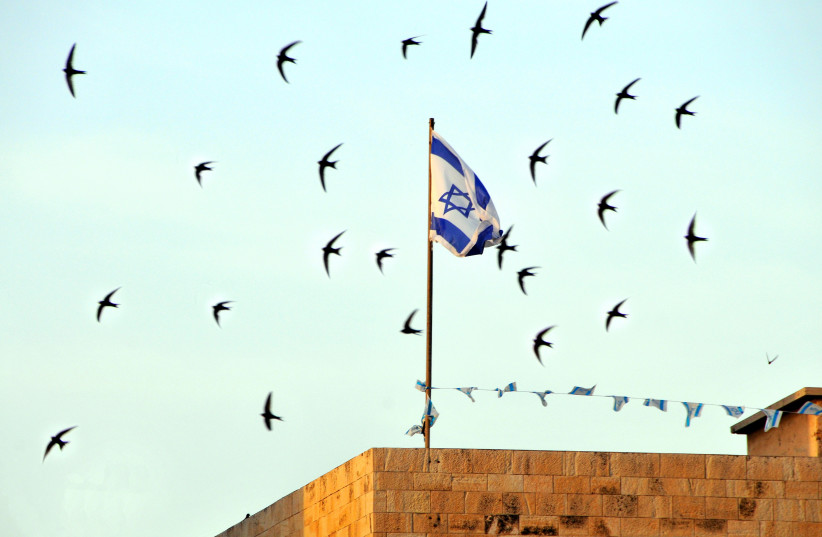Rabbi Emanuel Forman was buried last Saturday night in Jerusalem. He was 89. Serving as a rabbi since the 1950s, Forman essentially had three rabbinates. First, as a Yeshiva University graduate, class of 1953, he had a seemingly conventional North American Orthodox pulpit, serving congregations in Brookline and Toronto. Then, in 1973, he started a less conventional rabbinate in Netanya, having made aliyah with his family.
Finally, because this thoughtful, thought-provoking, inspirational soul was not the retiring type – in both senses of the word – he spent years as an interim rabbi. Emerging as the intercontinentalische Zionist Rebbe, he parachuted into congregations in transition in Siberia, Bombay, Los Angeles, Berkeley, and Montreal, where I was privileged to meet him and his extraordinary wife of 63 years, Maxine.
Forman and I bonded 20 years ago during his second stint at the Shaar Hashomayim, Montreal’s flagship synagogue. During the dark days of Yasser Arafat’s war against the Oslo peace process, he and his wife generated strength and light. As a too-small number of us took each terrorist attack against our Israeli brothers and sisters personally, they supported us and spurred us on.
Once, after yet another Palestinian-triggered bloodbath, and more condemnations – against Israel for defending itself – I denounced Western hypocrisy bitterly. When I finished speaking, Forman uttered just two magic words: Lo le’hityaesh – don’t despair. This living link to a different Jewish reality offered a much-needed historical, theological, ideological and psychological perspective.
He was born 15 years before Israel’s rebirth, born when the pre-Holocaust Eastern European Jewish world of piety and scholarship that sustained him and other Yeshiva University graduates was thriving. He had witnessed European Jewry’s destruction – from the safe distance of America – and then witnessed the Zionist redemption.

Since then, I have often echoed his words. Central to my Zionism has been a fury at the injustice of terrorism, delegitimization, and antisemitic anti-Zionism, tempered by this refusal to despair, this insistence on marveling at the modern miracle of Israel.
Forman, Maxine, my wife, and I had many fascinating discussions about God’s role in all this – and whether a “God of history” dictates who lives and who dies. As a student of “the Rav,” Rabbi Joseph Soloveitchik, and a talmid chacham – learned man – himself, Forman brought to this and other discussions a traditionalist’s depth, piety, and rigor, balanced by an American-inflected openness, softness, and zest-for-life, that, ahem, Eastern European rabbis sometimes lacked.
Beyond his smarts, and his warmth as a cherished friend, Forman was also an ace davener, praying passionately and purely while staying on key. In preparing for his bar mitzvah, one of our sons explored great philosophical issues with his tutor, without mastering the Shacharit service he would soon lead. We sat with Forman, whose musical passion bridged from organizing YU’s choir in the 1950s to taking piano lessons half a century later. In one memorable session, Forman freed my son from approaching prayers as musical pieces to perform properly by hitting each note. Instead, Forman said, “improvise, go with the flow, feel the prayer, the tradition, and the music” – and my son still does.
Always formally dressed with his big black kippah, Forman looked like your typical Orthodox rabbi – he was anything but. In 1965, as a young rabbi at the Young Israel of Brookline, he heard Martin Luther King, Jr.’s call for clerics to march for voting rights and equality in Selma, Alabama. On that day when Rabbi Abraham Joshua Heschel said “our march was worship, I felt my legs were praying,” Forman prayed-protested with his body too.
Unsure what his synagogue board would say, he “forgot” to ask for permission, before flying south. In Selma, the non-Orthodox rabbis proudly donned kippot – which activists christened “Freedom Caps.” Protesting as a proud American and a committed Jew, Forman wore Freedom Boxes that day too, landing in the airport and walking around Alabama wrapped in tefillin.
Eight years later, when the Yom Kippur War broke out, Forman felt another righteous calling: to go East, not South. He and his beloved family had made aliyah in 1972 – and it was tough. The Middle East then was like the Wild West. Six months later, the Yom Kippur War broke out. Many American immigrants bailed.
Refusing to sit on the suburban sidelines any longer, unable to imagine witnessing a second churban – destruction – after the Holocaust – Forman stayed. He stayed not to defend Israel, but to build Israel, to contribute to the Jewish people’s redemption.
Ultimately, the Formans thrived, launching Netanya’s still-strong McDonald International Shul. Forman kept doing what he had been doing his entire career – touching people’s lives, shaping their souls.
Once he “retired,” Forman had the perfect personality for his final professional incarnation as an itinerant rabbi. This rabbinic Johnny – or Yoni – Appleseed spread his infectious love of Israel, of Judaism, of Zionism, of the Jewish people, and of people worldwide. He and Maxine were healers, builders, diplomats, and charmers.
They often landed on divided, brittle congregations, armed only with their good natures and deep thoughts. Characteristically, they made fast friends for life from Bombay to Berkeley, from Westmount to Siberia.
We join the Forman family in mourning his loss. And we, members of the international Manny Forman fan club, also join them in celebrating his soul.
